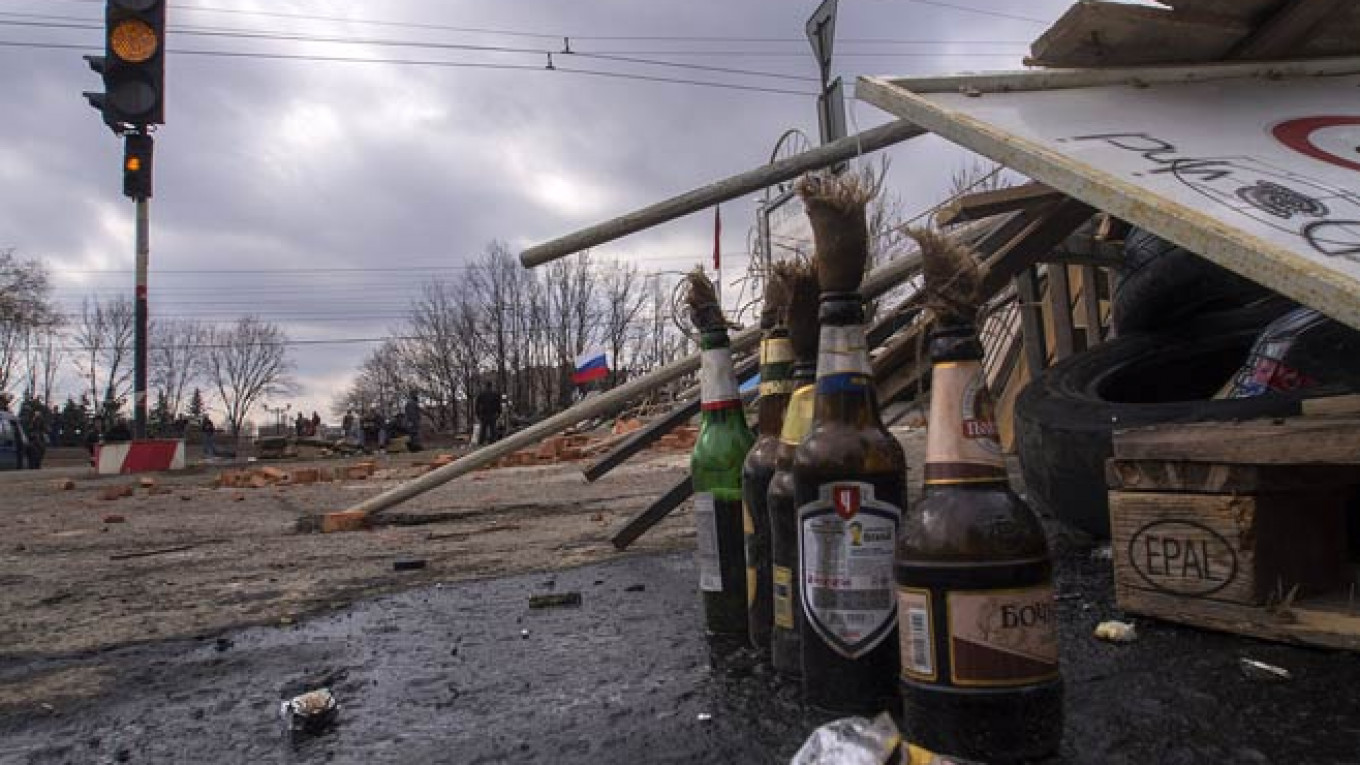LUGANSK, Ukraine — Ukrainian authorities on Wednesday warned that they are prepared to use force to clear several government buildings seized by pro-Russian separatists in the east of the country.
Protesters continued to occupy the headquarters of Ukraine's security service in the eastern city of Lugansk, with hundreds of supporters camped outside and shouting "Putin! Putin!" in support of the Russian president.
The security agency had earlier said that the separatists inside the building, armed with explosives and other weapons, allowed 56 hostages to leave the building during the night. A spokeswoman said there were no other hostages.
But Tetyana Pohukay, a regional police spokeswoman, disputed that statement, saying there had never been any hostages inside, Interfax reported.
The Lugansk security service building was among several government offices seized by pro-Moscow groups Sunday in an escalation of protests against the interim government in power since the ouster of President Viktor Yanukovych in February.
Serhiy Tyhipko, a lawmaker associated with the previous Ukraine government, urged the authorities not to storm the building in Lugansk but rather negotiate a peaceful solution. Tyhipko said the protesters were demanding to turn Ukraine into a federal state with broad regional autonomy, not to secede.
"The people are not bringing up the issue of breaking off from Ukraine and are not calling for the help of foreign countries," Tyhipko said on his Facebook page.
Turning Ukraine into a federation is Russia's key demand and the new government in Kiev has refused to fulfill it, calling it a precursor to a breakup. In Donetsk, where protesters were still occupying the government building, the regional governor was meeting with key figures in the pro-Russian protest movement to try to find a solution to the crisis
In Donetsk, where protesters were still occupying the government building, the regional Governor Serhiy Taruta was meeting with key activists at a hotel to try to find a solution to the crisis.
All the cities affected by the uprisings are in Ukraine's industrial Russian-speaking heartland in the east, which has a large population of ethnic Russians and economic and where cultural ties to Russia are strong. Many residents are suspicious of government that took power in February.
Interior Minister Arsen Avakov said the standoff in Lugansk and the two neighboring Russian-leaning regions of Donetsk and Kharkiv must be resolved within the next two days.
"I want to repeat that there are two options: political settlement through negotiations and the use of force," Avakov told reporters. "We are ready for both options."
Avakov was speaking as anti-government protesters in Lugansk erected high barricades along a thoroughfare running in front of the security service premises.
Overnight, speakers at a gathering in front of the building condemned the government in Kiev and renewed demands to be allowed to hold a referendum on declaring autonomy for their region. That demand is similar to one that preceded Crimea's annexation by Russia.
The Ukrainian government and the U.S. have accused Moscow of fomenting the unrest as a pretext for another Russian military incursion similar to last month's takeover of Crimea. Up to 40,000 Russian troops are massed along the Ukrainian border, according to NATO.
Speeches at the rally were occasionally interspersed with chants of "Russia! Russia!" and an unidentified speaker won cheers as he listed names of prominent politicians that he suggested should be executed.
Those occupying the building have issued a video statement warning that any attempt to storm the place would be met with force.
In the video, posted by Ukrainian media, a masked man identified the occupiers as Ukrainian veterans of the Soviet war in Afghanistan and warned the authorities against trying to retake the building. "Welcome to hell, then!" he said.
A Message from The Moscow Times:
Dear readers,
We are facing unprecedented challenges. Russia's Prosecutor General's Office has designated The Moscow Times as an "undesirable" organization, criminalizing our work and putting our staff at risk of prosecution. This follows our earlier unjust labeling as a "foreign agent."
These actions are direct attempts to silence independent journalism in Russia. The authorities claim our work "discredits the decisions of the Russian leadership." We see things differently: we strive to provide accurate, unbiased reporting on Russia.
We, the journalists of The Moscow Times, refuse to be silenced. But to continue our work, we need your help.
Your support, no matter how small, makes a world of difference. If you can, please support us monthly starting from just $2. It's quick to set up, and every contribution makes a significant impact.
By supporting The Moscow Times, you're defending open, independent journalism in the face of repression. Thank you for standing with us.
Remind me later.






